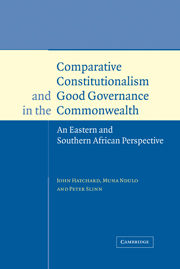 Comparative Constitutionalism and Good Governance in the Commonwealth
Comparative Constitutionalism and Good Governance in the Commonwealth Published online by Cambridge University Press: 23 June 2009
Introduction
There are typically three levels of government: national, sub-national (regional), and local government. Decentralisation stresses the attribution of central government functions to lower levels of government (regional or local units), to which may then be granted a sphere of autonomy protected against the supremacy of national government. In answer to the demands for a greater self-determination and influence in decision-making, many countries worldwide are devolving political, fiscal, and administrative powers to sub-national tiers of government. This trend can be seen in countries with a long tradition of centralist government, as well as in federalist systems, and in developing as well as industrialised countries.
This chapter provides a more general analysis of the subject-matter than others in this book because the issue of the devolution of power is one that many of the ESA states have yet to address adequately. The ESA independence constitutions did not provide for elected governments accessible to the people at the local level. Rather the local government systems that were established were centrally controlled by the Ministry of Local Government and power remained consolidated in the central government. With the exception of South Africa and Uganda, this situation still largely remains the same.
In this chapter we examine the arguments for devolution; the powers sub-national tiers of government should enjoy; the relationship between sub-national tiers of government and the central government; and the critical elements that must be addressed if devolution is to succeed.
To save this book to your Kindle, first ensure no-reply@cambridge.org is added to your Approved Personal Document E-mail List under your Personal Document Settings on the Manage Your Content and Devices page of your Amazon account. Then enter the ‘name’ part of your Kindle email address below. Find out more about saving to your Kindle.
Note you can select to save to either the @free.kindle.com or @kindle.com variations. ‘@free.kindle.com’ emails are free but can only be saved to your device when it is connected to wi-fi. ‘@kindle.com’ emails can be delivered even when you are not connected to wi-fi, but note that service fees apply.
Find out more about the Kindle Personal Document Service.
To save content items to your account, please confirm that you agree to abide by our usage policies. If this is the first time you use this feature, you will be asked to authorise Cambridge Core to connect with your account. Find out more about saving content to Dropbox.
To save content items to your account, please confirm that you agree to abide by our usage policies. If this is the first time you use this feature, you will be asked to authorise Cambridge Core to connect with your account. Find out more about saving content to Google Drive.